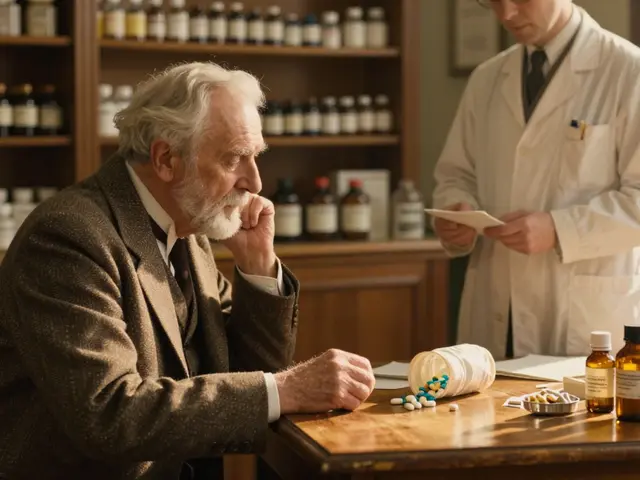Hey, you just had a little surgery, huh? While you're on the mend, you're probably wondering how to keep the pain at bay without losing your mind. We all know that minor surgeries can cause some major discomfort. It's kinda like when you stub your toe—annoying, but manageable.
First off, don't shy away from those pain meds your doctor prescribed. There's no medal for toughing it out. But remember, they work best when taken as directed. It's a balance, you know? You want relief, but you don't want to overdo it.
Rest is your new best friend. Seriously, cash in on those Netflix binges and afternoon naps. Your body heals faster when you're chilling out. It might feel like you're doing nothing, but actually, you're doing everything right by taking it easy.
And let's not forget about listening to your body. If something feels off—like a pain that just won't quit—it's okay to hit up your doctor. Better safe than sorry, right? So go on and give yourself the care you deserve. You've got this!
- Understanding Post-Surgery Pain
- Effective Pain Relief Techniques
- The Role of Rest and Relaxation
- When to Call the Doctor
- Lifestyle Tips for a Speedy Recovery
Understanding Post-Surgery Pain
Alright, so you're wondering why it feels like you just got run over by a truck post-surgery. Pain after a minor surgery is totally normal and expected. But what's causing all this discomfort?
First, there's the body's natural response to the surgical procedure. When your tissues get cut, your body jumps into action to heal, sending signals that translate into what we feel as pain. It's just your body's way of saying, "Hey, I'm working here!"
Now, different surgeries cause different pain levels. For example, dental surgeries might bring some mouth discomfort, whereas a minor knee surgery could make walking a chore for a bit. Knowing what you've had done helps set your pain expectations.
Let's get a bit science-y: pain is often a mix of inflammation, swelling, and muscle spasms. And while pain meds can help, there's more to managing it than popping pills. Understanding these factors is key to handling your recovery smoothly.
- Inflammation: Those tissues are inflamed because they're working overtime to heal you up.
- Swelling: It's like a balloon, things feel tight because things are repairing underneath.
- Muscle spasms: Restlessness that you might feel in the area is just your body doing its thing, so take it as a sign you're on the mend.
Remember, your pain levels can also depend on your pain threshold, which is different for everyone. Keeping an honest track of your symptoms helps guide not just your use of medication but also when it's time to check in with your doc.
Effective Pain Relief Techniques
Alright, let's dive into some straightforward strategies to keep that post-surgery pain under control. Being smart about managing your discomfort can make all the difference in your recovery journey.
First up, the classic: medication. It's not just about popping pills, though. Those prescribed pain meds? Use them wisely. Always follow the dosage instructions to a T. Timing is everything when it comes to staying ahead of the pain. If you've been green-lighted to use over-the-counter options like ibuprofen or acetaminophen, these can be quite handy too, especially as you start to phase out stronger meds.
Next on the list, we've got the good old ice and heat combo. Not at the same time, of course! For the first two days, icing the area can reduce swelling and numb some of that ouchiness. After about 48 hours, switching to gentle heat can help relax tight muscles and boost circulation.
Simple as it sounds, elevation works wonders, especially if your surgery site is on a limb. Raise the area above heart level when you can. This little move helps reduce swelling and eases blood flow.
Then there's relaxation techniques. Sounds woo-woo, but hey, they work! Deep breathing, meditation, or even guided imagery can help your mind cope with the sensations of pain. Giving your brain a break can alter the way you perceive discomfort.
| Technique | Benefit |
|---|---|
| Medication | Quick pain control |
| Ice and Heat | Swelling reduction and muscle relaxation |
| Elevation | Decreases swelling |
| Relaxation | Improves mental coping |
And, whatever you do, don't underestimate the power of hydration and nutrition. Staying hydrated helps flush out toxins, while a balanced diet supports healing. It all plays a part in helping you feel better, faster.

The Role of Rest and Relaxation
Alright, you know what they say, 'rest is best'—especially when it comes to recovering from minor surgery. Your body's just been through something, and it needs some downtime to patch things up.
Most folks don't realize how critical slowing down can be for post-surgery recovery. It's like recharging your phone; you wouldn't expect 100% on a 15-minute charge, right? Your body requires time to replenish, and that's where rest comes in.
When you're healing, aim for a solid sleep routine. Try sticking to a consistent bedtime and wake-up schedule, which can actually help reduce inflammation and pain. The National Sleep Foundation suggests that between 7 to 9 hours is the sweet spot for adults.
But don’t just limit yourself to sleep. Incorporate relaxation techniques to ease off tension and discomfort. For instance, gentle breathing exercises or even a short walk (when you're up for it) can do wonders.
And here's a cool fact—relaxation can positively influence your pain perception. That discomfort you feel may not be as intense when you're in a restful state.
Relaxation isn’t about laziness; it’s about letting your body catch up. So give yourself permission to press pause on everything and focus on you. It might just be the fastest track to getting back to your old self.
When to Call the Doctor
So, you've had **minor surgery** and you're keeping your cool so far. But when do you ring up the doctor? Good question! Knowing the signs can make all the difference in nipping problems in the bud.
First up, if your pain suddenly jumps from an annoying two to a gut-wrenching eight on the pain scale, that's your cue to give your doc a call. Pain's got a way of telling you something's not quite right.
Next, watch out for any funky changes in your incision area. We're talking about swelling, redness, or any seepage that doesn't look like it's part of the healing process. Oh, and if there's an odd smell coming from it, that’s a big red flag!
Fevers are another thing to keep an eye on. If you've got a temperature over 100.4°F (38°C), it's time to check in. Fever's like your body waving a little red flag that it might be trying to fend off an infection.
And don't ignore nausea or vomiting, especially if it keeps on going. It might be a side effect of medication or a sign of something else that needs addressing.
Here's a handy checklist for those quick calls:
- Searing pain or quick changes in pain level
- Swelling or redness at the surgical site
- Pus or discharge that seems off
- Fever over 100.4°F (38°C)
- Persistent nausea or vomiting
While the list covers a lot, trust your gut feelings too. When in doubt, just check with your health pro. It's better to call on time than wish you had.

Lifestyle Tips for a Speedy Recovery
Alright, so you're on the road to recovery. It's not just about chilling in bed all day (though that's a big part), but it's about making a few smart choices to get back on your feet faster. Here's how to speed things up a bit:
- Stay Hydrated: Water is your best friend right now. It helps flush out toxins and keeps everything working as it should. Aim for 8 glasses a day—your body needs it.
- Eat Balanced Meals: Your body craves nutrients for healing. Load up on fruits, veggies, lean proteins, and whole grains. Vitamin C and protein are like your recovery crew.
- Gentle Movement: Once your doc gives the green light, try short walks around the house. It boosts circulation and can help reduce post-surgery pain.
- Avoid Smoking and Alcohol: Both can slow healing—so ditch 'em, at least for a bit. It's a good excuse for a mini health makeover.
- Sleep Like a Baby: Quality sleep is vital. It's when your body repairs itself, so prioritize rest. If pain keeps you up, a hot water bottle or gentle stretches might help.
Recovery is a team effort, and you play the most crucial role. Make these small changes and see how much better you feel each day. You're on your way!




Lindsey Bollig
July 17 2025I've dealt with minor surgeries before, and honestly, keeping a consistent medication schedule was a total game changer for me. It’s tempting to skip meds when the pain feels manageable, but that often leads to spikes in discomfort later. Also, don’t underestimate the power of rest—not just the obvious lying down, but really limiting movement that stresses the surgical area.
Another tip I always share is using ice packs during the first 24-48 hours to reduce swelling, which significantly eases pain. Some people mix ice with heat—but be careful and follow what your doctor advises specifically for your surgery. It’s amazing how much lifestyle tweaks like proper hydration and nutrition help too.
Really, patience is key here. Healing can feel slow, but pushing yourself too hard only setbacks recovery. Has anyone else found any other tricks that worked well during their recovery?